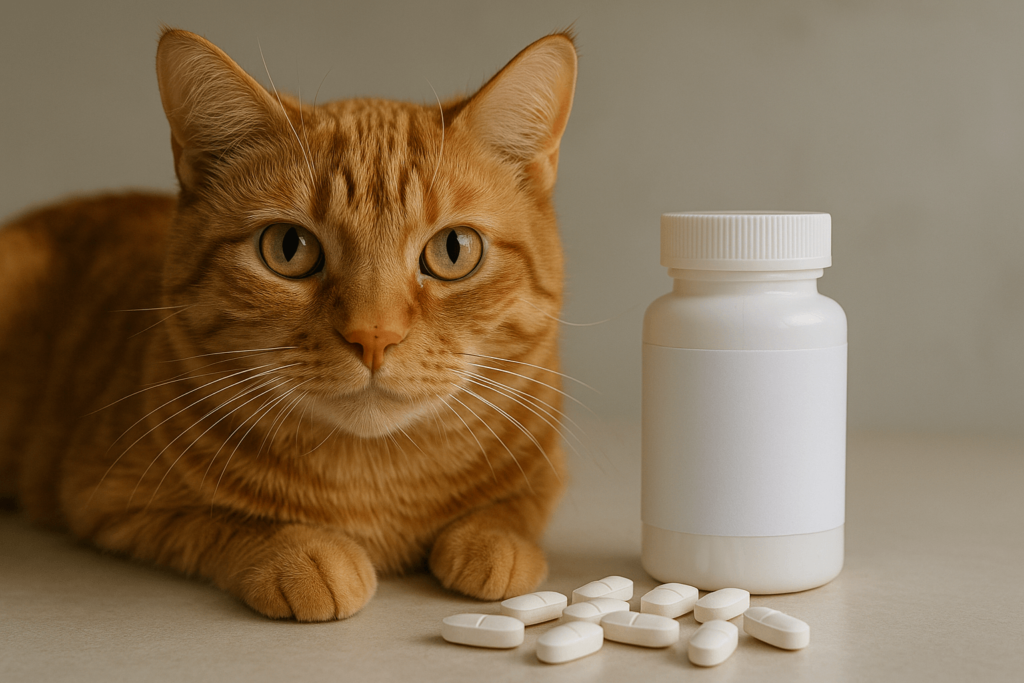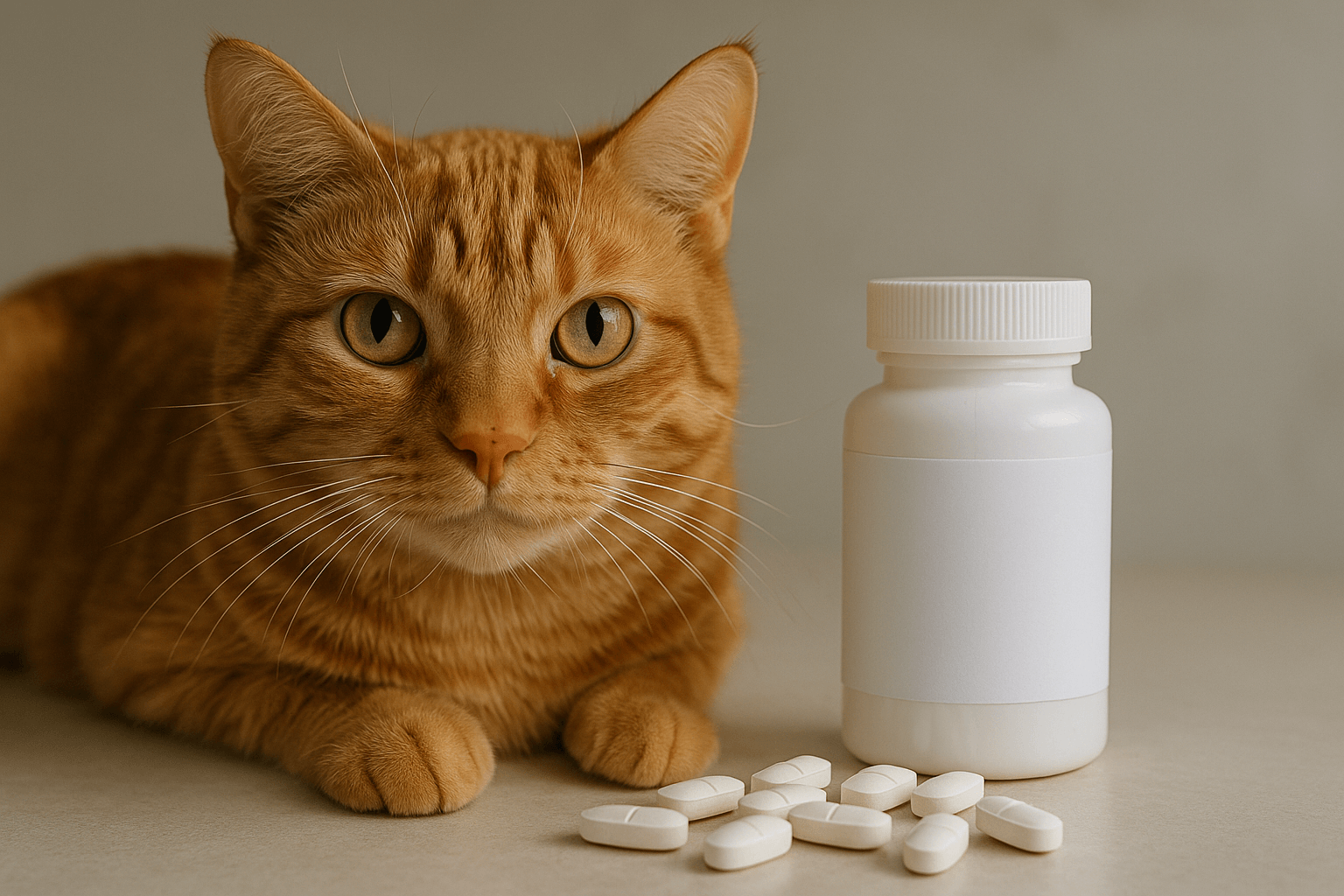Methimazole for Cats: What You Need to Know
Methimazole is a widely prescribed medication used to treat hyperthyroidism in cats, a common condition among older felines. Hyperthyroidism occurs when the thyroid gland produces excessive amounts of thyroid hormones, leading to symptoms like weight loss, increased appetite, and restlessness. Methimazole works by reducing the production of these hormones, helping to restore balance and improve your cat’s quality of life. While this medication can be highly effective, it’s essential to understand how it works, its potential side effects, and how to administer it safely. In this guide, we’ll explore everything you need to know about methimazole for cats, ensuring you’re equipped to care for your furry friend with confidence.
How Methimazole Works to Treat Hyperthyroidism
Understanding how methimazole functions is key to appreciating its role in managing feline hyperthyroidism. This medication targets the root cause of the condition, offering relief for both cats and their owners.
Reduces Thyroid Hormone Production:
Methimazole inhibits the enzyme responsible for creating thyroid hormones, effectively lowering hormone levels in the bloodstream.Improves Symptoms Quickly:
Many cats experience noticeable improvements in energy levels, appetite regulation, and overall well-being within weeks of starting treatment.Non-Invasive Treatment Option:
Unlike surgery or radioactive iodine therapy, methimazole is administered orally, making it a convenient choice for many pet owners.Reversible Effects:
If side effects occur, discontinuing methimazole allows thyroid hormone production to return to its previous state, providing flexibility in treatment.Long-Term Management Solution:
For cats that respond well, methimazole can be used as a lifelong treatment to maintain stable thyroid function.
By addressing the overproduction of thyroid hormones, methimazole helps cats regain their health and vitality, improving their quality of life significantly.

Common Side Effects of Methimazole in Cats
While methimazole is generally safe, some cats may experience side effects during treatment. Recognizing these symptoms early allows you to address concerns promptly with your veterinarian.
Gastrointestinal Upset:
Vomiting, diarrhea, or loss of appetite are common but usually resolve as your cat adjusts to the medication.Skin Reactions:
Itching, redness, or facial swelling may indicate an allergic reaction, requiring immediate veterinary attention.Lethargy or Weakness:
Some cats may appear unusually tired or weak, which could signal an adverse reaction to the drug.Changes in Blood Work:
Methimazole can sometimes affect liver enzymes or blood cell counts, necessitating regular monitoring.Behavioral Changes:
Increased irritability or unusual behavior may occur but often subsides with continued use or dosage adjustments.
Most side effects are mild and manageable, but staying vigilant ensures your cat remains healthy throughout treatment.
Check this guide 👉Bravecto for Cats: Best 7 Expert Tips!
Check this guide 👉Understanding Meloxicam for Cats: Best 7 Expert Tips!
Check this guide 👉Vitamins for Cats: Best 7 Expert Tips!
Benefits of Methimazole for Cats | Potential Risks to Monitor |
|---|---|
Effectively lowers thyroid hormone levels | Possible gastrointestinal upset |
Improves energy and appetite regulation | Risk of skin reactions or allergies |
Non-invasive oral administration | Potential impact on liver function |
Reversible if side effects occur | Behavioral changes in some cases |
Long-term management option | Requires regular vet check-ups |
Tips for Administering Methimazole to Your Cat
Giving medication to a cat can be challenging, but with the right approach, you can make the process smoother for both you and your pet. These tips will help ensure your cat receives their dose consistently.
Use Pill Pockets or Food Wraps:
Hide the pill in a soft treat designed for medication delivery, making it easier to administer without resistance.Crush and Mix (If Approved):
Consult your vet before crushing the pill and mixing it with wet food or a favorite snack to mask the taste.Stay Calm and Confident:
Cats sense anxiety, so approach the task calmly to avoid escalating stress during administration.Reward with Treats or Playtime:
Immediately reward your cat after giving the pill to create positive associations with the experience.Consider Transdermal Options:
If oral administration proves too difficult, ask your vet about transdermal methimazole applied to the ear.
With patience and creativity, administering methimazole can become a manageable part of your daily routine.
When to Contact Your Veterinarian About Methimazole
While methimazole is generally safe, certain situations warrant immediate consultation with your veterinarian. Knowing when to seek help ensures your cat stays healthy and comfortable.
Severe Side Effects:
Persistent vomiting, lethargy, or difficulty breathing should be addressed urgently.Signs of Allergic Reaction:
Facial swelling, hives, or intense itching require prompt medical attention.Blood Work Abnormalities:
If routine tests reveal significant changes in liver enzymes or blood cell counts, your vet may adjust the dosage or explore alternatives.Refusal to Eat:
A sudden loss of appetite could indicate discomfort or intolerance to the medication.Unusual Behavior Changes:
Aggression, disorientation, or extreme lethargy may signal complications requiring professional evaluation.
Staying proactive and communicating openly with your vet ensures your cat receives the best possible care.
Alternative Treatments for Hyperthyroidism
While methimazole is a popular choice, alternative treatments exist for managing feline hyperthyroidism. Exploring these options can help you find the best fit for your cat’s needs.
Radioactive Iodine Therapy:
This one-time treatment destroys overactive thyroid tissue without affecting surrounding areas, offering a permanent solution.Thyroidectomy Surgery:
Surgical removal of the affected thyroid gland eliminates the source of excess hormones but carries anesthesia risks.Low-Iodine Diets:
Specialized diets restrict iodine intake, reducing thyroid hormone production naturally.Herbal Supplements (Under Vet Guidance):
Some pet owners explore herbal remedies, though scientific evidence supporting their efficacy is limited.Combination Therapies:
Combining methimazole with dietary changes or supplements may enhance results under veterinary supervision.
Each option has pros and cons, so discuss thoroughly with your vet to determine the best course of action.
Monitoring Your Cat’s Progress
Regular monitoring is crucial when using methimazole to ensure your cat responds well to treatment and remains free of complications.
Routine Blood Tests:
Schedule regular blood work to monitor thyroid hormone levels, liver function, and overall health.Track Weight Changes:
Sudden weight gain or loss may indicate adjustments are needed in the treatment plan.Observe Energy Levels:
Note improvements or declines in activity, sleep patterns, and general demeanor.Watch for New Symptoms:
Report any unusual behaviors or physical changes to your vet immediately.Maintain Open Communication:
Share updates with your veterinarian at every stage to fine-tune dosages or explore alternatives.
Consistent monitoring ensures your cat’s treatment remains safe and effective over time.
Supporting Your Cat Through Treatment
Caring for a cat with hyperthyroidism involves more than just administering medication. Providing holistic support enhances their recovery and overall well-being.
Create a Stress-Free Environment:
Minimize noise and disruptions to reduce stress, which can exacerbate symptoms.Offer Nutritious Meals:
High-quality, balanced nutrition supports immune function and aids recovery.Encourage Gentle Exercise:
Light play sessions stimulate circulation and muscle strength without overwhelming your cat.Provide Comfortable Resting Spaces:
Ensure your cat has cozy, quiet areas to relax and recharge during treatment.Celebrate Small Wins:
Acknowledge progress, no matter how small, to stay motivated and focused on your cat’s healing journey.
Holistic care complements medical treatment, fostering a nurturing environment where your cat can thrive.
Frequently Asked Questions About Methimazole for Cats
How long does it take for methimazole to work?
Most cats show improvement within 2-4 weeks of starting treatment.
Can methimazole cure hyperthyroidism?
Methimazole manages the condition but does not cure it; other treatments like surgery or radioactive iodine may offer a permanent solution.
What happens if I miss a dose?
Give the missed dose as soon as you remember, unless it’s close to the next scheduled dose. Never double up doses.
Are there alternatives to methimazole?
Yes, options include radioactive iodine therapy, surgical removal of the thyroid gland, or dietary management with low-iodine foods.
Can methimazole be given long-term?
Yes, many cats remain on methimazole for years with proper monitoring and adjustments as needed.
Empowering Your Cat’s Health Journey with Methimazole
Methimazole plays a vital role in managing feline hyperthyroidism, offering a practical and effective way to improve your cat’s quality of life. By understanding how the medication works, recognizing potential side effects, and mastering administration techniques, you can confidently support your cat’s health journey. Regular communication with your veterinarian ensures any challenges are addressed promptly, paving the way for a happy, healthy future together. With love, care, and the right tools, you can help your feline companion thrive despite their diagnosis.
Can I Give My Cat Midol? Best 7 Expert Tips! – Learn the risks, symptoms, and safe alternatives to keep your cat healthy and avoid toxic reactions.
Can I Give My Dog Midol? Best 7 Expert Tips! – Discover the risks, safe alternatives, and expert advice to keep your dog safe from accidental poisoning.
Maximum Weight for Cats on Planes: Best 7 Expert Tips! – Learn airline policies, tips to stay compliant, and ensure safe travels for your feline friend.
Max Weight for Dogs on Planes: Best 7 Expert Tips! – Discover airline weight limits, safe travel tips, and solutions for flying with your dog stress-free.





